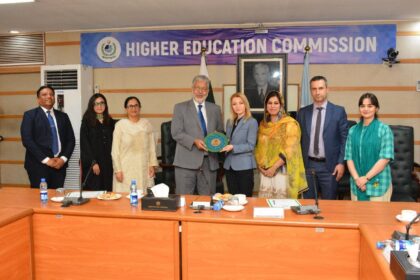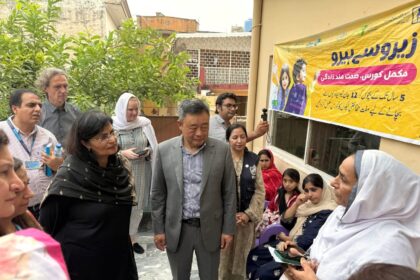**National Skills University Islamabad: Pioneering Skills-Based Education for Pakistan’s Economic Growth**
The National Skills University (NSU) Islamabad is emerging as a key driver of skills-based education in Pakistan, equipping students with practical and industry-relevant expertise to meet the country’s economic and employment needs. Through cutting-edge programs and strategic collaborations with leading organizations, NSU is shaping a workforce capable of thriving in the global digital economy, reducing unemployment, and supporting national industrial growth.
Established under the federal government, NSU stands apart from traditional universities by focusing on a blend of theoretical knowledge and hands-on training tailored to the demands of the job market. The university is designed to prepare students for the challenges of the Fourth Industrial Revolution, emphasizing modern technologies and skills that can be directly applied in industrial settings. By offering laboratory-based learning and cooperative programs with industry partners, NSU enables graduates to secure employment swiftly, supporting both their professional ambitions and Pakistan’s broader economic objectives.
Pakistan faces a significant challenge: high unemployment among educated youth, primarily due to a disconnect between academic education and the practical requirements of employers. Skills-based education, as promoted by NSU, addresses this gap by training students in fields such as artificial intelligence, data science, financial technology, and other areas that align with global trends. This approach not only enhances individual employability but also strengthens the national economy by creating a skilled workforce, driving industrial productivity, encouraging innovation, and attracting foreign investment. Additionally, it improves the performance of local sectors like agriculture, manufacturing, and information technology—helping Pakistan compete on a global scale.
Skills-based education also promotes economic diversification, supporting Pakistan’s transition from a reliance on agriculture and select industries to a broader range of sectors, including information technology, renewable energy, and digital finance. The tangible impact of this shift can already be seen in the country’s rising IT exports and the expansion of digital financial services. Importantly, skills-based training also empowers women by providing them with the expertise necessary for technical and professional roles, fostering financial independence and increasing their participation in the economy.
A central pillar of NSU’s impact is its strategic industry partnerships. By working closely with organizations such as Serena Hotel, Habib Microfinance Bank, and Zekab International, the university provides students with valuable practical experience. These collaborations allow students to gain industry insights and skills in fields like hospitality, financial technology, and e-commerce. For example, Serena Hotel offers hospitality and tourism students real-world training and internships, while Habib Microfinance Bank introduces fintech and e-commerce students to trends in digital finance and financial inclusion. Zekab International exposes students to global markets and advanced business strategies, further enhancing NSU’s academic and practical standards.
NSU’s academic offerings are tailored to the needs of a modern economy. The Bachelor of Business Administration (BBA) program delivers a comprehensive education in key business disciplines such as finance, marketing, supply chain management, and entrepreneurship. With a curriculum aligned to the Higher Education Commission’s standards, the BBA program emphasizes practical learning through projects, case studies, and internships. Unique collaborations with the IT department allow students to specialize in areas like financial technology—developing business leaders who are equally adept in digital transformation.
The BS Hospitality and Tourism program is another cornerstone of NSU’s mission, addressing the growing needs of Pakistan’s tourism sector. By integrating hotel management, tourism operations, and event management with industry internships and practical training, the program produces graduates who can deliver services up to international standards. With Pakistan’s wealth of natural and cultural resources, a skilled workforce in hospitality and tourism is critical for generating foreign exchange and boosting local businesses.
Similarly, the BS Fintech and E-Commerce program positions students at the forefront of the digital economy. This program covers essential topics such as blockchain, cryptocurrencies, data analytics, digital marketing, and online sales management. With industry projects and internships, students gain hands-on experience with real-world challenges. With the rapid growth of platforms like JazzCash, Easypaisa, and Daraz, NSU graduates are well-placed to join and drive innovation in financial and e-commerce institutions, supporting both national economic advancement and their own career prospects.
Through its emphasis on skills-based education and robust collaboration with industry, NSU is playing a transformative role in strengthening Pakistan’s economy. Its graduates are not only employable but are also equipped to meet the evolving needs of businesses and contribute to the country’s economic competitiveness on the global stage. Programs such as BBA, Hospitality and Tourism, and Fintech and E-Commerce ensure that students receive training in modern technologies and practical experience through industry partnerships.
The success of NSU’s mission is supported by the leadership of Professor Dr. Muhammad Mukhtar, the university’s founding Vice Chancellor, as well as the dedication of the faculty and the institution’s strong industry links. By empowering youth with practical skills and knowledge, NSU is helping Pakistan reduce unemployment, embrace global economic trends, and unlock new opportunities for development and prosperity. The university stands as a beacon of hope for the country’s youth and a vital force for national progress.











